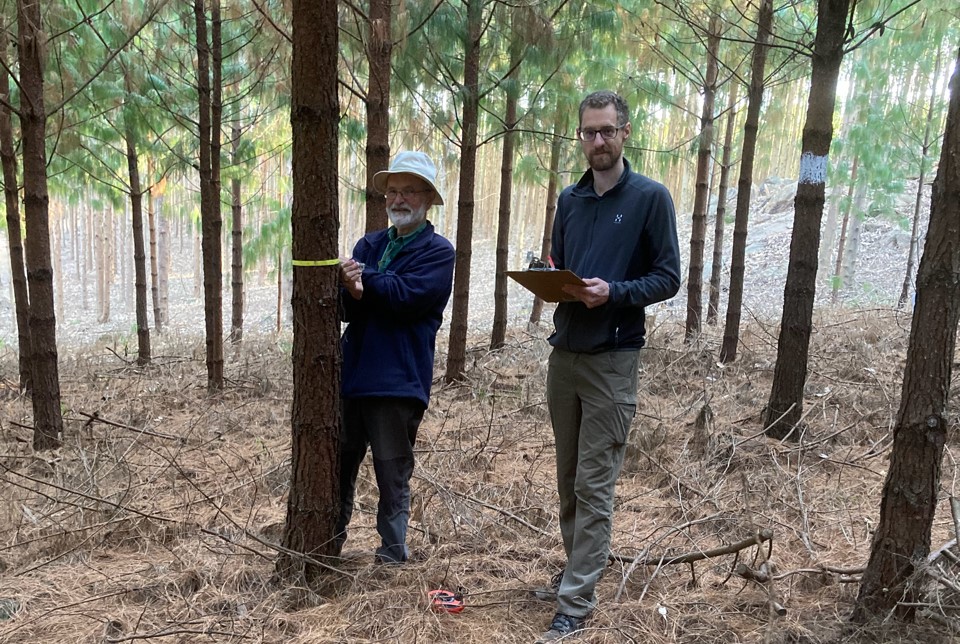
Probably few alumni can claim still to be working on their PhD research topic 50 years after gaining the degree. But in Eswatini – formerly Swaziland – I have enjoyed the privilege of continuing to assess sustainability of productive pine plantations through five cycles or rotations of crops. I return to that land locked country, that is smaller than Wales, every two or three years.
It all began just after sitting my finals in forestry in 1968 when Professor Dennis Richardson summoned me to his office in Deiniol Road. The degree results hadn't been released, but I was told I was going to do well and would I be interested in doing a PhD in Swaziland? Would I? I was on cloud nine and hot footed to Rathbone Hall to find Margaret, my fiancee, to share the news. A couple of days later her father and I climbed all fourteen 3000 ft peaks in Snowdonia in one long day of just over 14 hours from leaving the top of Snowdon to arriving in the easterly most peak of Carneddi. I think I was having to prove something before marrying his daughter.
My first year in Swaziland began with my supervisor, Geoff Elliott, but I was soon on my own to work out how to compare mature first rotation pine stands with young second rotation ones that looked distinctly off-colour. ODA (now DFID) funded the research because there was worldwide concern that fast growing tree plantations may not be sustainable for crop after crop. Would yields decline over time?
Margaret had remained in Bangor completing a Masters in mathematics. We married in June 1969 with both of us then going to Swaziland to complete the second and main phase of the sustainability fieldwork. But something else had happened in 1968-69 while I was in Africa – a new student church was formed. It met in Ebenezer Chapel in Caellepa. Margaret was one of its first members and, subsequently, I one of its first baptismal candidates. The very first baptisms were in the sea off Anglesey but by the time I took this step of commitment and faith in Christ we were able to use the small Baptist Church on Penrallt. Today, Ebenezer Evangelical Church continues to thrive and is located at St Pauls Terrace in the middle of Bangor.
Researching for a PhD in Swaziland opened my eyes to the potential of planted forests in the tropics and sub-tropics and a few years later I was appointed lecturer in forestry in the University of Technology in Papua New Guinea. It was while there that I did what many academics do and turned my lectures into a textbook, Plantation Forestry in the Tropics, which was published by Oxford University Press in 1982. It remains in print and is in its third edition. It was this book, along with research back in Britain at the Forestry Commission's southern research station of Alice Holt Lodge that led to my second book, Silviculture of Broadleaved Woodland (HMSO), which formed the basis of the award of DSc with the support of Professor Larry Roche. I believe it was Bangor's first senior doctorate in forestry.
Since then involvements with Bangor have remained close with an honorary chair, 1995-2005, and becoming an Honorary Fellow of the university in 2017. But looking back to the mid-1960s what most strikes me is that today forestry is even more centre stage than it was then as we strive to achieve net-zero by 2050. Ambitious tree planting targets to expand forest cover and far greater use of timber in construction as the green way to build are at the forefront. And Bangor remains at the forefront of providing research, teaching and training in this expanding field.
And what has the long-term research in Swaziland shown? It is good news: each crop of pines has grown as well or better than its predecessor. We now have measurements from five successive rotations: growing timber in forest plantations is sustainable. We can now be sure, thanks to a Bangor research project that began in the late 1960s.
But there's one other loose end from my Bangor days. I became a Christian during my PhD research and, being someone who likes to write, have ended up as author of God's Trees - Trees, woods and forests in the Bible. It's a coffee table book published by DayOne, Leominster (2nd Edn. 2018). The coming together for me of faith and forestry has been a great blessing, particularly so as a direct descendant of Thomas Charles of Bala that great preacher and author of the Welsh Bible Dictionary, Geiriadur Charles, - as too was Bangor's former Principal, the late Sir Charles Evans, who was my father's cousin.
Professor Julian Evans OBE FICFor
Forestry Commissioner
